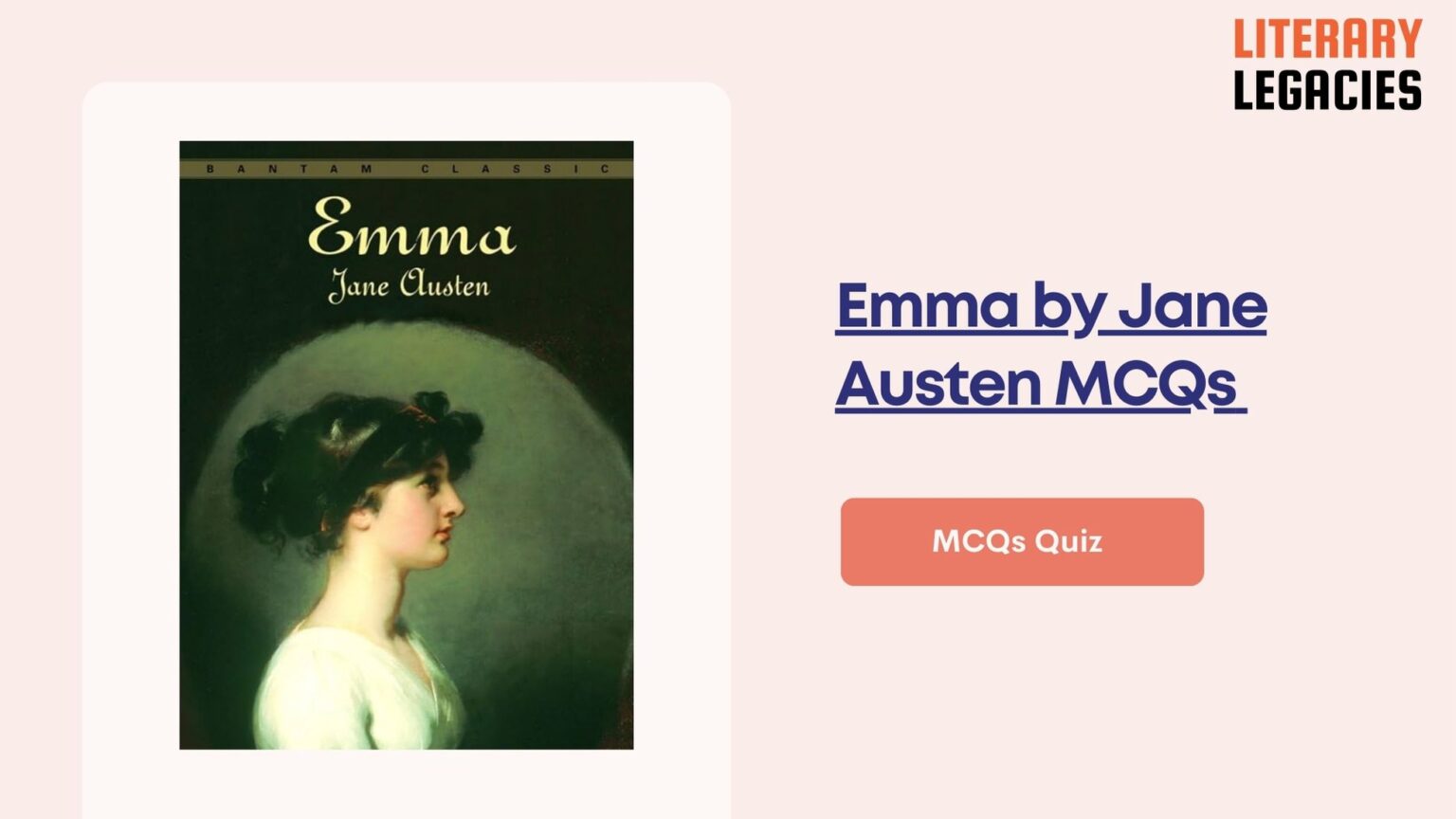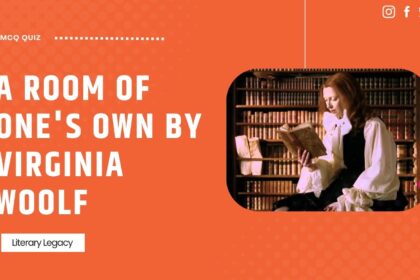1. Who is expected to visit his father in Highbury?
A. Mr. Elton
B. Mr. Weston
C. Frank Churchill
D. Mr. Knightley
Answer: Frank Churchill (C)
Frank Churchill has been raised by his aunt and uncle in London.
2. Why has Frank Churchill been deterred from visiting his father?
A. Because of his dislike for Highbury
B. Because of his aunt’s illnesses and complaints
C. Because of his father’s disapproval
D. Because of his busy schedule
Answer: Because of his aunt’s illnesses and complaints (B)
Frank’s aunt has been ill and complaining for a long time.
3. What does Mr. Knightley defend Jane Fairfax for?
A. Her beauty and accomplishments
B. Her independence and fortune
C. Her situation as a governess
D. Her compassion and kindness
Answer: Her situation as a governess (C)
Jane Fairfax is soon to leave home to work as a governess.
4. Who is Emma Woodhouse jealous of?
A. Frank Churchill
B. Harriet Smith
C. Jane Fairfax
D. Mr. Knightley
Answer: Jane Fairfax (C)
Emma is jealous of Jane’s beauty and accomplishments.
5. Who does Emma imagine as a match for Harriet?
A. Mr. Knightley
B. Robert Martin
C. Frank Churchill
D. Mr. Elton
Answer: Frank Churchill (C)
Emma thinks Frank could be a good match for Harriet.
6. What does Frank Churchill save Harriet from?
A. A robbery
B. Gypsy beggars
C. A village fire
D. A horse riding accident
Answer: Gypsy beggars (B)
Frank Churchill saves Harriet from Gypsy beggars.
7. Who does Emma suspect Harriet has fallen in love with?
A. Frank Churchill
B. Mr. Knightley
C. Mr. Elton
D. Robert Martin
Answer: Frank Churchill (A)
Emma thinks Harriet is in love with Frank Churchill.
8. Why can Frank Churchill now marry Jane Fairfax?
A. Because Jane has inherited a fortune
B. Because his uncle has approved
C. Because his aunt has died
D. Because Emma has given her permission
Answer: Because his aunt has died (C)
Frank’s aunt’s death has paved the way for his marriage to Jane.
9. Who proposes to Harriet after Frank Churchill’s engagement is revealed?
A. Mr. Knightley
B. Mr. Elton
C. Robert Martin
D. Frank Churchill
Answer: Robert Martin (C)
Robert Martin proposes to Harriet after Frank’s engagement is revealed.
10. Who does Emma Woodhouse realize she is in love with?
A. Mr. Elton
B. Robert Martin
C. Frank Churchill
D. Mr. Knightley
Answer: Mr. Knightley (D)
Emma realizes she is in love with Mr. Knightley.
11. What is Emma Woodhouse’s self-proclaimed talent?
A. Matchmaking
B. Cooking
C. Playing music
D. Dancing
Answer: Matchmaking (A)
Emma believes she is naturally gifted in conjuring love matches.
12. Who does Emma persuade Harriet to reject a proposal from?
A. Mr. Martin
B. Mr. Knightley
C. Mr. Elton
D. Mr. Weston
Answer: Mr. Martin (A)
Emma thinks Mr. Elton is a better match for Harriet.
13. Who does Emma imagine would be a good match for Harriet?
A. Mr. Martin
B. Mr. Weston
C. Mr. Elton
D. Mr. Knightley
Answer: Mr. Elton (C)
Emma thinks Mr. Elton is an eligible match for Harriet.
14. Why does Mr. Elton leave Highbury?
A. He is ill
B. He is offended by Emma’s insinuation
C. He wants to visit his family
D. He gets a new job
Answer: He is offended by Emma’s insinuation (B)
Emma implied that Harriet is his equal, which offended him.
15. What is the outcome of Emma’s matchmaking efforts for Harriet?
A. Harriet marries Mr. Martin
B. Harriet rejects Mr. Elton
C. Harriet marries Mr. Elton
D. Emma’s plans go awry
Answer: Emma’s plans go awry (D)
Emma’s plans for Harriet and Mr. Elton do not go as she intended.
16. Who is Emma’s brother-in-law and treasured friend?
A. Mr. Knightley
B. Mr. Weston
C. Mr. Martin
D. Mr. Elton
Answer: Mr. Knightley (A)
Mr. Knightley is Emma’s brother-in-law and close friend.
17. What is Harriet’s status at the beginning of the story?
A. Widow
B. Governess
C. Farmer’s daughter
D. Orphan with unknown parents
Answer: Orphan with unknown parents (D)
Harriet’s parentage is unknown, but Emma wants to find her a suitable husband.
18. Who does Emma successfully match in the past?
A. Her governess and Mr. Weston
B. Her sister and Mr. Weston
C. Mr. Martin and Harriet
D. Harriet and Mr. Elton
Answer: Her governess and Mr. Weston (A)
Emma is proud of her success in matching her governess with Mr. Weston.
19. What is Mr. Knightley’s opinion of Mr. Martin?
A. He thinks Mr. Martin is unsuitable for Harriet
B. He thinks Mr. Martin is a worthy young man
C. He dislikes Mr. Martin
D. He is neutral about Mr. Martin
Answer: He thinks Mr. Martin is a worthy young man (B)
Mr. Knightley believes Mr. Martin is a suitable husband for Harriet.
20. How does Mr. Elton react to Emma’s rejection?
A. He tries to woo Emma again
B. He marries another girl in Bath
C. He apologizes to Emma
D. He stays in Highbury and forgives Emma
Answer: He marries another girl in Bath (B)
Mr. Elton is offended and leaves Highbury, where he marries another girl.
21. What was one of the main ways to raise one’s social status in Austen’s time?
A. Through family background only
B. Through marriage
C. Through wealth only
D. Through hard work and personal achievement
Answer: Through marriage (B)
Marriage was one of the main ways in which one could raise one’s social status, especially for women.
22. Why was Mr. Weston’s first marriage to Miss Churchill not entirely successful?
A. Because she came from a poor family
B. Because she was not intelligent
C. Because of the inequality of their social status
D. Because she was not beautiful
Answer: Because of the inequality of their social status (C)
The inequality of their social status caused hardship to both Mr. Weston and Miss Churchill.
23. Why was Mr. Weston’s second marriage to Mrs. Weston happier?
A. Because Mrs. Weston was younger
B. Because Mrs. Weston was more beautiful
C. Because their social statuses were more equal
D. Because Mrs. Weston was wealthy
Answer: Because their social statuses were more equal (C)
Mr. Weston’s second marriage to Mrs. Weston was happier because their social statuses were more equal.
24. Why did Emma want Harriet to reject Robert Martin’s proposal?
A. Because Robert Martin was poor
B. Because Robert Martin was not of noble blood
C. Because Robert Martin was not handsome
D. Because Emma believed Harriet may have noble blood
Answer: Because Emma believed Harriet may have noble blood (D)
Emma believed that Harriet may have noble blood and therefore encouraged her to reject Robert Martin’s proposal.
25. What was one of the factors that determined social status in Austen’s time?
A. Wealth only
B. Family background only
C. A combination of family background, reputation, and wealth
D. Personal achievement only
Answer: A combination of family background, reputation, and wealth (C)
Social status was determined by a combination of family background, reputation, and wealth.
26. Why was marriage crucial for women in Austen’s time?
A. Because it was one of the main ways they could raise their social status
B. Because they were not allowed to work
C. Because they were not allowed to own property
D. Because they were not allowed to choose their husbands
Answer: Because it was one of the main ways they could raise their social status (A)
Marriage was crucial for women in Austen’s time because it was one of the main ways they could raise their social status.
27. Why did Emma’s match-making efforts for Harriet fail?
A. Because Harriet was already married
B. Because Harriet did not want to marry
C. Because Emma’s match was not suitable for Harriet
D. Because Emma did not know Harriet’s parents
Answer: Because Emma’s match was not suitable for Harriet (C)
Emma’s match-making efforts for Harriet failed because her match was not suitable for Harriet.
28. What was the outcome of Mr. Weston’s first marriage to Miss Churchill?
A. They divorced
B. The inequality of their social status caused hardship to both
C. They lived happily ever after
D. They had many children
Answer: The inequality of their social status caused hardship to both (B)
The inequality of their social status caused hardship to both Mr. Weston and Miss Churchill.
29. Why was Mrs. Weston fortunate to be rescued from her need to work?
A. Because she was a governess
B. Because she was old
C. Because she was poor
D. Because she was not beautiful
Answer: Because she was a governess (A)
Mrs. Weston was fortunate to be rescued from her need to work because she was a governess.
30. What was the outcome of Emma’s attempt to match Harriet with Mr. Elton?
A. The match was shunned by the other characters
B. They became friends
C. They never met
D. They got married
Answer: The match was shunned by the other characters (A)
Emma’s attempt to match Harriet with Mr. Elton was shunned by the other characters.
31. What is the primary reason Frank Churchill must keep his engagement to Jane Fairfax secret?
A. He is afraid of social disapproval
B. His wealthy aunt would disapprove
C. He is worried about Jane’s reaction
D. He is not sure of his feelings for Jane
Answer: His wealthy aunt would disapprove (B)
Frank Churchill’s wealthy aunt would disapprove of his engagement to Jane, which is why he keeps it secret.
32. What is the significance of the novel’s focus on marriage?
A. It emphasizes the importance of romantic love
B. It shows that women have many options in life
C. It highlights the importance of social class
D. It offers women a chance to exert their power
Answer: It offers women a chance to exert their power (D)
In the novel, marriage is shown to be a way for women to exert their power and affect their own destinies.
33. How does Emma’s imagination lead to misunderstandings in the novel?
A. It blinds her to objective judgment
B. It helps her to understand others better
C. It makes her more objective
D. It makes her less biased
Answer: It blinds her to objective judgment (A)
Emma’s imagination and biases often lead to misunderstandings and misinterpretations in the novel.
34. What is the consequence of the social conventions of propriety in the novel?
A. Characters are able to express their feelings openly
B. Characters are unable to express their feelings directly
C. The characters are able to overcome their biases
D. The conventions of propriety do not affect the characters
Answer: Characters are unable to express their feelings directly (B)
The social conventions of propriety in the novel lead to characters being unable to express their feelings directly and openly.
35. What is the portrayal of a mother’s life in the novel?
A. It is portrayed as idle and lacking in intellectual use
B. It is portrayed as a mix of both
C. It is not portrayed in the novel
D. It is portrayed as fulfilling and intellectually stimulating
Answer: It is portrayed as idle and lacking in intellectual use (A)
The novel portrays a mother’s life, through Isabella’s character, as idle and lacking in intellectual use.
36. What is the significance of the governess profession in the novel?
A. It is a way for women to exert their power
B. It is a last resort for women without a good match
C. It is a preferable option to marriage
D. It is a desirable profession for women
Answer: It is a last resort for women without a good match (B)
In the novel, the governess profession is portrayed as a last resort for women without a good match.
37. What is the tone of the narrator’s voice in the novel?
A. Neutral and objective
B. Admirable and frequently ironic
C. Critical and sarcastic
D. Emotional and sentimental
Answer: Admirable and frequently ironic (B)
The narrator’s voice in the novel is admirable and frequently ironic, allowing the reader to see the characters’ misunderstandings and biases.
38. What is the result of the series of realizations in the novel?
A. The characters’ relationships remain unchanged
B. The plot becomes more complicated and confusing
C. Characters become more biased and misunderstand each other
D. Characters are able to make fuller and more objective judgments
Answer: Characters are able to make fuller and more objective judgments (D)
The series of realizations in the novel allows characters to make fuller and more objective judgments, leading to greater understanding and resolution.



